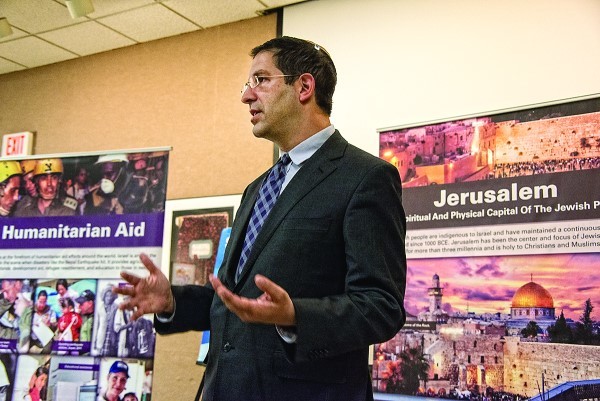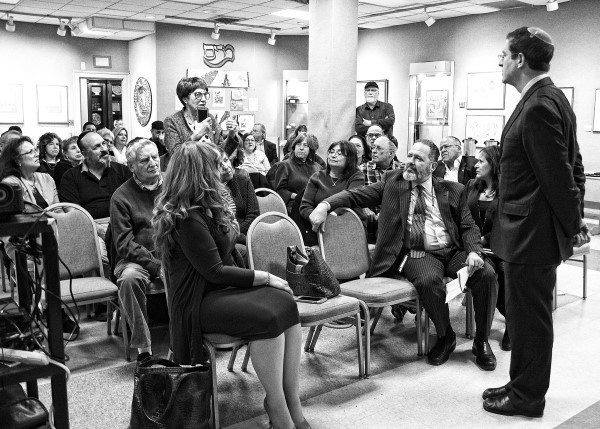Despite the threats, Jerusalem journalist optimistic about Israel
Gil Hoffman, the chief political correspondent for The Jerusalem Post, spoke about the geopolitical landscape in the Middle East and many of the pressing issues that Israel faces during a visit to Temple Emanu-El, in Providence, on March 21.
Hoffman, who was once called “the most optimistic person in Israel” by Israel Television, was characteristically upbeat about the future of Israel and the Jewish people in his lively and amusing talk, which was hosted by StandWithUs Rhode Island. The Jewish Voice had the opportunity to sit down with Hoffman before his speech for a Q&A session. Here are excerpts from our interview:
Q: What do you believe is the greatest threat currently facing Israel?
A: The Israeli school system – because we have 40 kids in a class and you can’t possibly learn that way. We want to continue to be leading the world in technology, and how are you going to do that if your kids aren’t getting the proper education? As a father of seven, I am quite concerned about that. The Iran threat seems rather distant compared to what you have to deal with day in and day out.
Q: Are you concerned about the threat that Hezbollah poses to Israel?
A: Absolutely. Hezbollah has 130,000 missiles and rockets aimed at Israel today. They are our most immediate strategic threat. And, yet, the head of military intelligence in Israel recently said that Israel has more intelligence on Hezbollah than any army has had on an enemy in the history of mankind.
Q: Do you believe peace between the Israelis and Palestinians will be achieved soon?
A: There’s a difference between peace and a peace agreement. Peace, I define as Israelis and Palestinians eating hummus together in public squares. That’s unrealistic. A peace agreement is Israelis and Palestinians eating hummus separately with a large security barrier in between. That’s easier to achieve than real peace.
Q: Do you believe a two-state solution is possible?
A: Technically, it can be done, if the other side changed itself completely. [Palestinian President Mahmoud] Abbas has given absolutely no indication of wanting to coexist with us, and the majority of Palestinians are against the two-state solution and in favor of destroying Israel, according to the Palestinian polls.
Q: What do you believe are the biggest roadblocks on the path to peace?
A: Palestinian public opinion and poor leadership for the Palestinians. We just overcame eight years of mishandling in Washington and now we have a president who is still trying to figure out what he wants.
Q: Why have peace talks failed in the past?
A: Because of the Palestinians and the Americans. Mistakes made by both Democratic and Republican presidents. Not because of us.
Q: As a resident of Jerusalem, and a citizen of Israel, do you see things in your daily life that reaffirm your belief that peace is possible?
A: Sure. You go to a doctor’s office and you see Jewish and Arab patients being treated by Jewish and Arab doctors, and you see real peace and coexistence happening. You see it at the grocery store and at the park with Mohammed and Menachem Mendel playing on the same swings.
Q: Do you have a message for the skeptics who say peace is not possible?
A: Never give up hope. We are the people of hope. We pray for peace three times a day. A lot of impossible things have happened. I’m a Cubs fan [Hoffman was raised in Chicago].
Q: What do you think is the greatest threat facing the Jewish people as a whole?
A: People not being connected enough to their Judaism. There is a two-thirds intermarriage rate in the United States. Some of those people stay connected, but it’s hard for them.
Q: President Trump has proposed moving the U.S. embassy to Jerusalem. As a resident of Jerusalem, what is your opinion on this potential move?
A: Who am I [as an Israeli] to tell people [in America] where their capital should be? And neither should America dictate to us where our capital should be.
Jon Kyl was the senator who initiated the Jerusalem embassy relocation act, and when he retired, he said that including the waiver, which allows the president every three months to say he’s not going to move that embassy was the biggest mistake of his life. All they have to do is move the sign on the door that says “Embassy” in Tel Aviv and put a sign that says “Consulate,” and take a piece of paper that says “Embassy” and put it on top of the sign that says “Consulate” in Jerusalem. I know that they say there will be violence and Arabs will revolt. But, I have a 4-year-old, and she also threatens violence, and I don’t give in to her.
Q: Israel Television called you “the most optimistic person in Israel.” How do you stay optimistic in such difficult times for Israel and the Jewish people?
A: My children. I get to see the experience of living in Israel as a child through them. My grandparents were Holocaust survivors. Their childhoods were taken away from them. They would have wished they could live the life that my children live, in a Jewish state, according to the Jewish calendar, with a strong army, and that makes the world a better place. How could you not be optimistic when you see that?
Q: What do you believe is the most effective way to combat anti-Israel movements like BDS [Boycott, Divestment and Sanctions]?
A: Education. Making sure people are informed and understand what Israel is doing to make the world a better place. The more Israel is needed, the less people can boycott it. You can’t boycott lifesaving medical equipment and technology.
Q: You have met with many Israeli and Palestinian leaders in your career – which ones did you enjoy interacting with most?
A: I really enjoyed getting to know [Ariel] Sharon and [Shimon] Peres because they were around for all of Israel’s history. They were there from the beginning of the state and before, and they were charismatic people.
Q: Why do you give lectures across the globe? What is the ultimate message you want to convey?
A: There are so many people around the world who care about Israel and they must stay informed. Justice is on our side, and the more people know the truth, the better it is for Israel.
I served in the army, but wasn’t exactly a combat soldier. This is my way of fighting for my country, both my countries. I want America to be strong, too. Israel makes America stronger and America makes Israel stronger, and the relationship between the two of them is the top strategic asset for Israel.
American Jews and others who love Israel need to be empowered and I am part of empowering them. What a great opportunity – I get to be part of history. I get to inform people around the world as history takes place in Israel through my news articles and analyses, and I do the same thing speaking in 12 countries, as I have, in 49 U.S. states.
SAM SERBY is a native of East Greenwich and attended Temple Sinai, in Cranston, for many years. He is a recent graduate of Johnson & Wales University.











